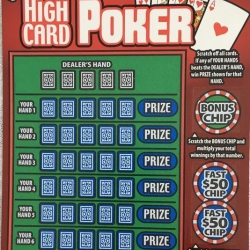The New Jersey Lottery pulled a new scratch-off card, High Card Poker, off shelves after confusion about the rules. The High Card Poker mishap is the latest in a string of fiascos for the NJ Lotto.
High Card Poker offered more than $13.6 million in prizes. When the game began sales of more than a million scratch-off cards on August 7, some players “questioned their win scenario.”
In the $5 game, players needed to beat the dealer’s head. The top prize was $150,000, but the game rules and instructions on the back of cards confused players. A number of lotto players thought they had won a big prize, only to learn they had won nothing.
High Card Poker Scratch-Off Problems
Robert Chalet of Bloomfield is a good example of a player experience. Chalet thought he had won a $150,000 grand prize, only to learn from the cashier that he had won nothing. The cashier told Chalet, “You won and you didn’t win.”
Chalet received a hand with a 5-6-9-J-Q, while the dealer had the hand 4-6-7-10-Q. In most land-based and Internet poker scenarios, Robert Chalet’s hand would be the winner. While the top card in each hand is a queen, Chalet’s second card (jack) beats the dealer’s ten.
Not so in High Card Poker. The game rules do not specify what happens when a tie occurs. Devoid of rules, cashiers across the state could not verify wins.
Lottery Spokeswoman Explains Problems
Lottery spokeswoman Judy Drucker said that scenario above played out in only a few hands. Drucker said, “The New Jersey Lottery has discontinued the sale of the High Card Poker instant game due to player misunderstanding of the game’s win scenarios, as stated on the back of the ticket.”
Drucker added the confusion happened “when a handful of players questioned their win scenario.”
Judy Drucker noted that all winners would be compensated for their winning tickets, thoughthe spokeswoman did not state whether customers like Robert Chalet would receive compensation. She challenged Robert Chalet’s version of the story he gave in an interview with TAPinto.net. Judy Drucker did not elaborate on the discrepency, but only told NJ.com the TAPinto “article is inaccurate”.
High Card Poker Rollout
The state lottery had to divert significant resources to stop High Card Poker sales. Employees crisscrossed the state picking up unsold tickets. They also used black markers to mark out point-of-sale advertisements.
The lotto website said 4,368,360 million tickets were printed for the High Card Poker scratch-off game, but Drucker said only 25% of the print run had occurred. It is the latest mishap for the New Jersey lottery.
Problems for Northstar New Jersey
Much of the blame has been placed on Northstar New Jersey, a private third-party operator who was contracted to improve the New Jersey Lottery’s technology. Northstar NJ has failed to deliver on promises, while coming under scrutiny from New Jersey state legislators for its marketing campaign and sales results.
This is the latest of several high profile incidents for Northstar New Jersey. In August 2015, the FastPick lotto game was launched, which offered the potential for instant results that would appeal to new players. FastPick sales prevented nearly half of the state’s lottery vendors from printing off regular lotto tickets, including Powerball and Pick-3 tickets.
Northstar’s Disappointing Lottery Sales
Over the past couple of years, Northstar has turned more to scratch-off games and instant picks, due to disappointing sales of tickets in Mega Millions and other big-jackpot games. Last month, the New Jersey Lottery received criticism from state legislators for its keno-style game, Quick Draw, due to the potential for problem gambling. Where most lottery games offer a couple of drawings a week or a higher payout percentage (on scratchoffs), Quick Draw had a drawing every 5 minutes (226 times a day) and a 60% payout percentage.
Since taking over the lottery’s core functions in 2013, Northstar has had its revenue projections slashed by $1 billion for the length of its 15-year contract, which ends in 2028. Not all of the blame is Northstar’s fault, because millennials do not enjoy playing the lottery the way previous generations have. In a time when wages are stagnated and prices continue to rise, millennials see lotto ticket purchases as an extravagence. Since the millennial generation is now the largest demographic in America, lottery projections based on population growth were entirely incorrect.

